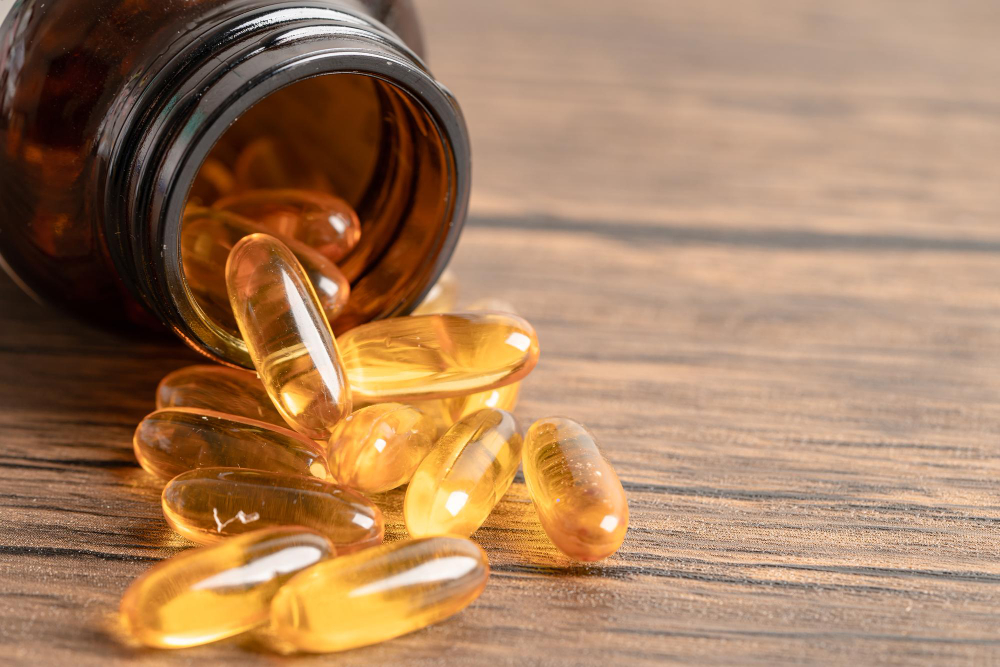EPA acid - properties, role, dosage

The very well-known omega-3 fatty acids are actually two types of compounds: DHA and EPA. Both are essential to us and ensure the proper functioning of the body. What are the characteristics of EPA? What are the properties of this acid? When is it worth taking it and in what products is it found?
Omega-3 fatty acids - essential unsaturated fatty acids
Omega-3 is a group of essential unsaturated fatty acids, in short EFA, which include EPA (eicosapentaenoic acid), DHA (docosahexaenoic acid) and ALA (alpha-linolenic acid).
ALA acid - alpha-linolenic acid
ALA acids belong to the group of primary acids. This means that the body cannot produce them from other acids. When ALA is taken, they are converted from secondary forms, namely EPA and DHA. It is estimated that about 10% of ALA is converted. Interestingly, the body itself adjusts the dose of acid that is converted.
DHA acid - docosahexaenoic acid
DHA acid is an exogenous fatty acid that the body cannot produce on its own. Although this compound is not naturally synthesized, it is essential for health. Among other things, DHA acid supports infant and child development, so its supplementation is crucial during pregnancy and lactation. DHA also supports the development of the baby's nervous system.
Additionally, DHA can increase visual acuity, support cognitive abilities such as memory, attention, concentration, and psychomotor development. DHA acids are sometimes used to treat endocrine disorders. They also show a cleansing effect and can border fatigue. Moreover, DHA stabilizes blood pressure.
EPA acid - eicosapentaenoic acid
EPA is an acid that is produced by the body in very limited amounts, and its deficiencies can contribute to many different diseases. The acid is primarily known for its hormone-regulating, cholesterol-lowering and blood-clotting properties. Like DHA, EPA contributes to the proper functioning of the nervous system in infants and children.
Effects of EPA acid
The listed properties of eicosapentaenoic acid are just a few examples of how this omega-3 acid can support our health on a daily basis. In fact, the action of EPA is comprehensive and involves many different systems and organs.
Maintaining adequate levels of EPA fatty acids:
- regulates hormonal balance and the menstrual cycle,
- relieves inflammation,
- shows beneficial effects on the condition of hair, nails and skin,
- enables normal fetal development,
- supports the function of the nervous system in infants and children,
- regulates blood clotting levels,
- reduces the amount of bad cholesterol in the human body,
- shows antioxidant activity,
- reduces the risk of allergies.
Recommended products with EPA acid
EPA sources
Other sources of acids are also vegetable oils, e.g. linseed oil rapeseed oil, as well as nuts, e.g. walnuts, pumpkin seeds, hemp seeds, sunflower seeds.
To naturally replenish EPA levels in the body, it is worthwhile to increase the consumption of fish in the first place. Although the amount of fish consumed in Poland is steadily increasing, there is still less fish consumed in our country than in other European Union countries. When arranging your diet, it is worth remembering that it is in oily sea fish, which we should eat 2-3 times a week, that the largest amounts of natural omega-3 fatty acids are hidden.
When consuming EPA-rich foods, the whole meal is very important. Products containing sugars may reduce the absorption of acid.
EPA - dosage
As we have already mentioned, eicosapentaenoic acid is produced in small amounts in the human body. However, its amount is so small that we should provide it with food or supplements. The body's requirement for omega-3, including EPA and DHA, depends on several factors, including age, activity level and state of health.
EPA requirement in an adult is 8-10 g of acid per day. In the case of pregnant women, the amount of EPA that we should supply from the outside increases - the recommended doses are even twice as high as in the case of the basic requirement of an adult.
Taking EPA in the form of a dietary supplement is very important for the elderly. Acid supplementation in adequate doses can not only support memory processes and cognitive abilities, as well as prevent dementia in old age.
